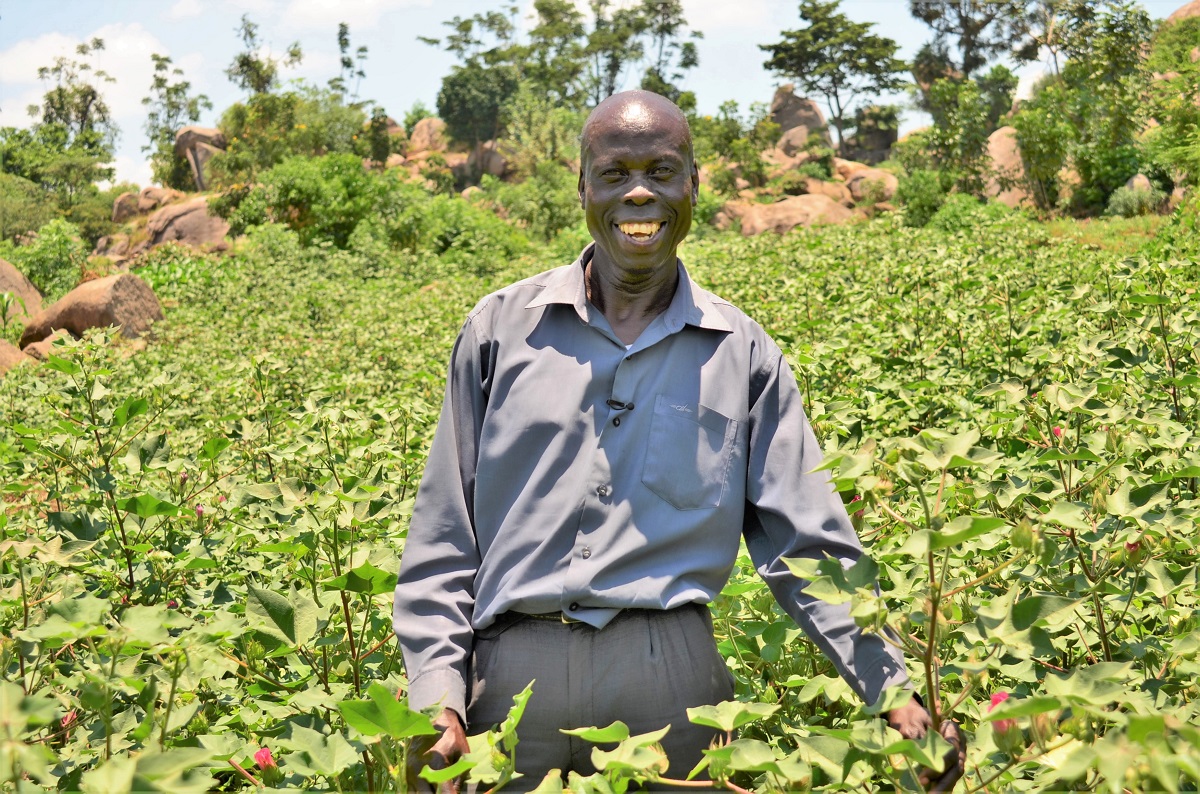
Kenyan Farmers Start Cultivating Biotech Cotton
November 4, 2020| |
Farmers in Kenya are finally planting biotech cotton. This is after the Cabinet approved the commercial cultivation of Bt cotton in an effort to revive the cotton industry, boost textile and apparel manufacturing. Bt cotton has been genetically improved to resist infestation by the African Bollworm, the single most destructive cotton pest in Kenya. Over 200 Bt cotton on-farm demonstration plots have so far been planted in western Kenya with plans underway to expand to other parts of the country. This is in an effort to prepare farmers for successful commercialization by ensuring training on appropriate agronomic practices and stewardship.
During a study tour organized by Open Forum on Agricultural Biotechnology in Africa (OFAB-Kenya chapter) and partners on October 28-29, 2020, farmer leaders expressed renewed hope in resuming profitable cotton farming. "Bt cotton presents me with a golden opportunity to provide for my family and secure the future of my children", remarked Mr. Francis Apailo, a cotton farmer in western Kenya. The farmers exuded confidence in the performance of Bt cotton in their farms and urged for timely seed delivery. They also recommended increased farmer-to-farmer exchange visits both in the country and the region so that African farmers can fully embrace Bt cotton, which they felt would benefit their families and the continent at large.
Accompanying the farmers, county leaders exuded confidence in the government's roadmap to revamp the cotton industry. "Commercial cultivation of Bt cotton will not only increase farmers' profits but also create numerous jobs for our youth," observed Mary Nzomo, Trans Nzoia County Executive Committee (CEC) member of Agriculture and chairperson of the 47 CECs of Agriculture Caucus. The stakeholders present acknowledged the importance of countrywide sensitization about the attributes of Bt cotton and the inclusion of all stakeholders to realize the successful implementation of the program.
The field study culminated with a visit to the Rift Valley Textiles (RIVATEX) East Africa Ltd, Kenya's premier textile factory. To run at capacity, the ultramodern factory requires 40,000 bales/year, 90 percent of which is currently being imported from neighboring countries. The country is currently producing 17,000 bales/year, barely enough to feed one factory with lint. Bt cotton cultivation is expected to close this deficit. Farmers appreciated the value chain structure put in place by the government to ensure a ready market for Bt cotton. The farmer leaders from seven cotton-growing counties were accompanied by CEC members of Agriculture, journalists, and other agricultural biotechnology stakeholders.
For more information on this and other biotech developments in Africa, contact Dr. Margaret Karembu at mkarembu@isaaa.org.
| |
You might also like:
- Long Wait Over as Kenya Finally Commercializes Bt Cotton
- Kenyan Government Banks on Bt Cotton to Revive Textile Industry
- Bt Cotton Approved for Planting in Kenya
Biotech Updates is a weekly newsletter of ISAAA, a not-for-profit organization. It is distributed for free to over 22,000 subscribers worldwide to inform them about the key developments in biosciences, especially in biotechnology. Your support will help us in our mission to feed the world with knowledge. You can help by donating as little as $10.
-
See more articles:
-
News from Around the World
- Kenyan Farmers Start Cultivating Biotech Cotton
- USDA-APHIS Invites Public Comments for Genetically Engineered Corn
- CABBI Team Sequences Miscanthus Genome
- Researchers Map Genome of Agricultural 'Monsters'
- Study Documents How Consumer Knowledge Influence Attitudes Towards GM Foods in Korea
- ASEAN Agriculture and Forestry Ministers Call for Sustained Significant Investment in Rice Research
- Researchers Map Plant Immune System
-
Research Highlights
- Striped Stem Borer-Resistant Rice Developed Using amiRNA Expression Technology
-
Plant
- MitoTALENs Used to Delete Mitochondrial Genes in Arabidopsis
- TALENs Used for Multiple Gene Knockout in Chrysanthemum
- All European Academies Call for Harmonization of the EU Legislation on Genome Editing
-
Read the latest: - Biotech Updates (April 17, 2024)
- Gene Editing Supplement (April 10, 2024)
- Gene Drive Supplement (February 22, 2023)
-
Subscribe to BU: - Share
- Tweet

